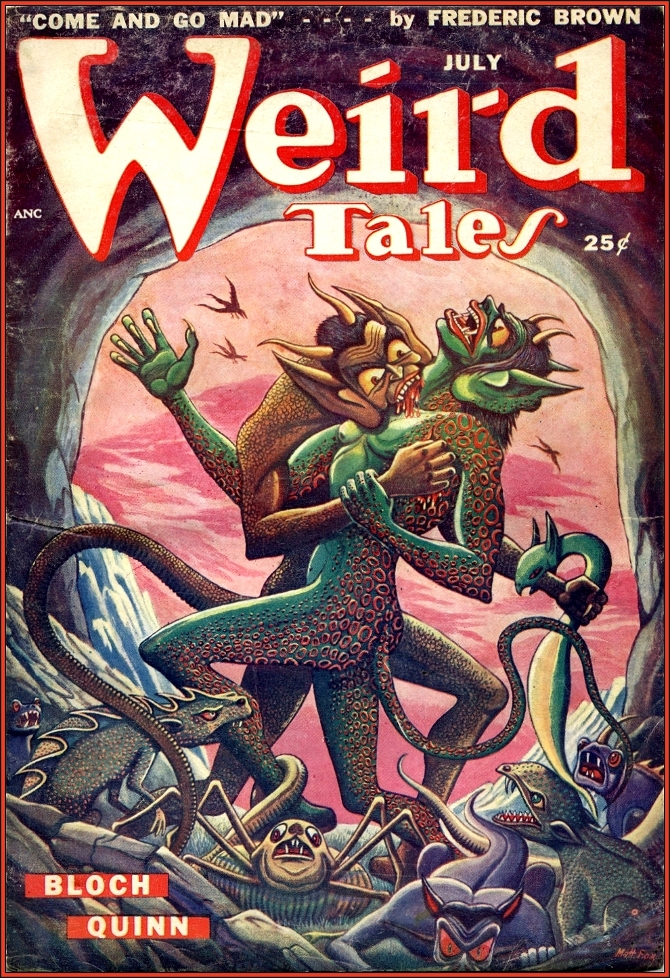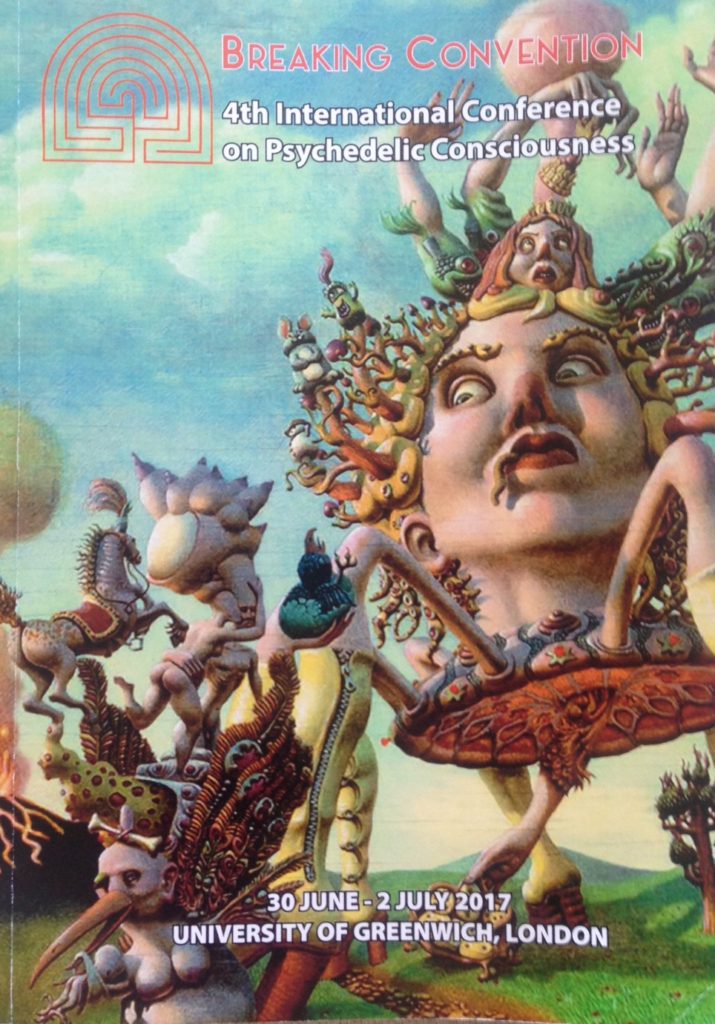The ethical and the numinous in psychedelic culture

I've spent the last two days at Breaking Convention, a conference on psychedelics at the University of Greenwich organized by some brave academics. It's my favourite academic conference, by a long stretch.
Academic conferences are typically uptight, dull, low-energy events, driven largely by ambition, fear, awkwardness and resentment. Breaking Convention isn't like that at all, it's a warm, friendly, freaky place, that brings together chemists, neuroscientists, therapists, artists, historians, philosophers, shaman, witches, performance artists, and a lot of DIY psychonauts. There's some great critical research there, but it's also totally fine to discuss your own weird experiences - they're also valid data. And there's a healthy pluralism of philosophical viewpoints, from naturalist to animist. That's totally different from the exclusive naturalism of most academic conferences.
When I attended the previous Breaking Convention in 2015, psychedelics looked on the verge of going primetime. We heard reports from scientists at institutions like NYU, Imperial College and Johns Hopkins of the remarkable therapeutic benefits of psychedelics: just one or two doses of psilocybin (the drug in magic mushrooms) helped 60% of participants in a small trial to overcome chronic depression; as well as 80% of participants in another trial to give up smoking. Psychedelics also significantly lowered death-anxiety in people with serious cancer, apparently by triggering a 'mystical experience'.
In the two years since then, I've been struck by how positive media coverage is of psychedelic therapy, even in the right-wing media. There have been enthusiastic articles in the Daily Mail, the Express, the Telegraph, and even a segment on micro-dosing on BBC daytime TV show, Victoria. If psychedelics really do help people overcome depression, anxiety, addiction and the fear of death (and they do), then it seems only a matter of time before they're legal, and available as a therapeutic treatment through the NHS.
I remember Rick Doblin, head of the psychedelic research organisation MAPS, saying in 2015 that psychedelics needed to stop being a transgressive counterculture and go mainstream. Less hippy freaks, more soccer moms. Well, microdosing for emotional healing is likely to be the way that happens. With careful microdosing, your reality is barely altered, you don't even get any visuals, but the psychedelics apparently still have an emotional or neuro-chemical effect at the subliminal level. Look at the citizen science movement in the US to legalize microdosing for cluster headaches - they don't want a revolution, they just want to stop having awful headaches (preferably paid for by medical insurance).
Keeping it weird
Yet what struck me most, during this Breaking Convention, was an anxiety about what might be lost if / when psychedelics are legalized and go mainstream. While there were sessions on new therapeutic trials of psychedelics, the main emphasis seemed to be on 'keeping it weird' - to quote the title of one session. I mean, look at the conference poster - this is not a movement rushing into the mainstream.
At one presentation, religious studies scholar Erik Davis said he wanted to resist the instrumentalization and medicalization of psychedelics. He liked the psychedelic counterculture - its weirdness, its trashiness, its transgressiveness. The audience - a motley crew of thai-dye freaks and feathered urban shaman - cheered their support. They're a guerrilla movement not ready to come out of the jungle.
Next to him, Dennis McKenna - ethnobotanist and brother of famous psychedelic guru Terence McKenna - told the story of a legendary psychedelic trip his brother and he undertook in their 20s, when they munched a huge amount of magic mushrooms in Colombia. Dennis disappeared for 14 days, 'dislocated in the space-time continuum', while his brother witnessed a giant UFO landing and spent the next decades of his life trying to construct a magic box which neither he nor anyone else fully understood. The psychedelic counter-culture loves this sort of weird tale, which eludes easy classification.

Psychedelic studies at the moment remind me of 17th-century natural philosophy, with its love of 'strange facts'. As historians Lorraine Dalston and Katherine Park explored in Wonders and the Order of Nature, there was a moment in the 17th century, when natural philosophers circulated accounts of anomalous events - weird animals, odd astronomical events, freaky experiments with electricity - partly as a means of chipping away at the hegemony of the Aristotelian worldview, and partly just for fun. But then, in the 18th century, these anomalous incidents become subsumed into the new consensus of materialism. Wonder and a yearning for the freaky came to be seen as vulgar.
Likewise, many psychedelic explorers are fascinated by the weird and marvellous. But eventually, either psychedelics will become absorbed into the existing secular materialist medical paradigm or - more likely - a new paradigm will emerge, a new consensus on reality, with its own rules and enforcers. What could that new paradigm be? What theology or ethics could emerge from the psychedelic renaissance?
The most obvious way psychedelic therapy is likely to change our worldview is by changing our idea of the self. You can either dismiss all psychedelic visions as meaningless, or you can interpret them as messages from some sort of Jungian or Jamesian subconscious. As Jung said, the subconscious seems to communicate to us through symbolic imagery. Trips are often healing - some intelligence in the subconscious wants to guide us to wholeness. The mainstreaming of psychedelics is also likely to underline the interconnectedness between the mind and the body, particularly the subconscious mind and the autonomic nervous system.
But what about the interconnectedness of our mind with others' minds, with the natural world, with the cosmos? What about people's encounters with spirit-beings?
As Tamara Freimoser and Elena Fountoglou have found, around 50% of people who take ayahuasca report 'encounters with supra-human spiritual entities', as well as 36% of people on DMT, 12% on psilocybin, 17% on LSD. Often, these encounters are healing - psychedelic trips seem to lower death-anxiety in patients with cancer because they report an encounter with some sort of 'higher power' which makes them believe materialism isn't the whole story and death isn't necessarily the end. The animist aspects of psychedelics are sometimes fundamental to the healing experience (though not always).
But not all encounters with spirit-beings are pleasant. According to the 'global ayahuasca project', which has interviewed around 1600 people who've taken ayahuasca, around 20% report the feeling of being under spiritual attack. In Rick Strassman's famous DMT experiment, participants reported encounters with weird alien creatures who probed, devoured and even raped them.
Are these experiences projections from the individual subconscious, or encounters with something real and transpersonal - a collective unconscious, the spirits of nature, ancestor-spirits, cosmic consciousness, aliens, Whatever? Who the hell knows. Strassman himself has now returned to Judaism and insists we need to learn the discernment of spirits to protect ourselves against malevolent spirit entities.
This is the trickiest issue for psychedelics as they go mainstream. On the one hand, psychedelics are very healing, and who's not up for healing?On the other hand, they sometimes involve spirit-encounters, and spirits are just…well…verboten in the existing secular materialist paradigm of medicine.
I would suggest that we, as a culture, don't get too hung up on the freaky. Weird things happen on trips, as they do on meditation retreats, pilgrimages, near-death experiences, and in ordinary life. You may encounter spirit-beings and not be entirely sure if they're projections or independent entities. You can get lost down that rabbit hole. The main thing is to try and become a wiser and more loving being. That's harder, and superficially less interesting, but more meaningful and valuable in the long-run. Maybe a personal encounter with Jesus Christ has hugely helped you to become a wiser and more loving person - that's awesome. But I don't think it's essential.
As the religious scholar Rudolph Otto said, every religion needs to find a balance between the numinous (ie religious or mystical experiences) and the ethical. You shouldn't exclude the numinous, but neither should you obsess over it and forget the ethical. The great theologian Huston Smith, who took psychedelics with Timothy Leary and was sympathetic to psychedelics, nonetheless warned:
A religion made up solely of heightened religious experiences would not be a religion at all…. The major religious traditions address the mysteries (with or without entheogens), but they have other business to do: widen understanding, give meaning, provide solace, promote loving-kindness, and connect human being to human being. This is my litmus test for any mental experience however induced: does it enhance your whole life, and then do you in turn enhance the lives of others?
Psychedelic culture needs to find a balance between numinous experiences like the McKennas' UFO encounters, and more basic ethical tasks - how to help people, how to make them more open, loving and wise. 'Traits, not states', insisted Huston Smith. Don't get hung up on seeking altered states for their own sake. Seek altered traits - are you becoming a kinder and wiser person? Psychedelics can help with that (there's some evidence they help make people more open and more reverential to nature, for example), but so can many other less dramatic spiritual practices like meditation, prayer, volunteering.
On the way to Breaking Convention, I listened to this great interview by Russell Brand with Sharon Salzberg, a leading Western practitioner of loving-kindness meditation (you can download it on iTunes here). I love Salzberg's pragmatic worldview - she doesn't exclude the supernatural, but she doesn't obsess over it. Brand constantly tests the limits of her worldview - does she believe in reincarnation? Yes. Does she believe in God?She notes how the Buddha remained silent on this question, suggesting that - whether there is a God / higher power or not, the human task remains the same of developing our consciousness and trying to become wiser and kinder beings, rather than getting stuck in disputes about whose God is better.
What about weird 'siddhis' or powers like telepathy or bilocation, which some holy people supposedly develop. Does she have any weird powers? No. Has she met holy people who do? Yes, but so what. 'If you really want to, you can learn to read minds, but it's not a path of wisdom, it's a path of power. I had a woman teacher, my most important teacher. She came to practice after losing her husband and two children. The doctor said to her you'll die of a broken heart unless you learn to meditate. So she went to the temple to learn to meditate. When she emerged, she was so compassionate and loving. She was radiant. They say she had powers. They say she could bake a potato in her hands. But so what? When I think of her I don't think of that. I don't care. She's the person who was loving to everyone.'
I think there probably are spirit-beings 'out there', but I don't think we should obsess over them. And attempts to describe God / the higher power are just attempts, we shouldn't get hung up on our imperfect verbal definitions, much less attack others for their different definitions. The main task facing homo sapiens is to become wiser and more loving beings. That's the North Star we need to stay focused on. The weird is fun but it's not the main event.


